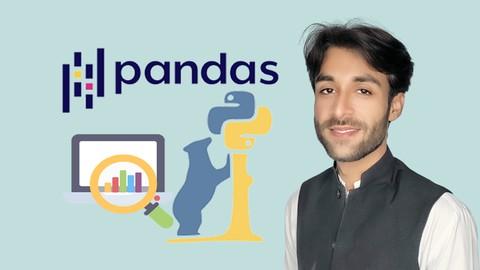Last Updated on November 14, 2023 by GeeksGod
Course : The Pandas Bootcamp | Data Analysis with Pandas Python3
Free Udemy Coupon: Introduction to The Pandas Bootcamp | Data Analysis with Pandas Python3
Are you interested in learning how to analyze and manipulate data efficiently using Python? Look no further! The “Introduction to The Pandas Bootcamp | Data Analysis with Pandas Python3” course is here to help you master the popular data manipulation library – Pandas.
Why Learn Pandas?
Pandas is a powerful library that provides data structures and functions designed to efficiently manipulate and analyze large datasets. It is widely used in data science and data analysis projects due to its versatility and ease of use.
Course Overview
This comprehensive course covers everything you need to know to start using Pandas for data analysis. It starts with the basics of installation and data structures and gradually progresses to more advanced topics such as window functions and visualization.
Chapter 1: Introduction to Pandas
In this chapter, you will get an overview of Pandas, its features, and why it is essential for data analysis. You will also learn how to install Pandas and set up your Python environment.
Chapter 2: Data Structures
Pandas provides various data structures such as Series, DataFrame, and Panel. In this chapter, you will explore these data structures and understand how to work with them effectively.
Chapter 3: Series
Learn about the Series data structure in Pandas, its attributes, different operations that can be performed on Series data, and programming examples.
Chapter 4: DataFrame
Discover the power of DataFrame in Pandas. This chapter covers DataFrame attributes, different operations, and programming examples to manipulate and analyze tabular data.
Chapter 5: Descriptive Statistics
Data analysis often involves descriptive statistics to summarize and analyze data. This chapter introduces various descriptive statistics methods and provides programming examples to analyze data effectively.
Chapter 6: Function Application
Learn how to apply functions element-wise, row or column-wise, and table-wise on data using Pandas. Get hands-on programming examples to master this concept.
Chapter 7: Reindexing and Sorting
Reindexing and sorting data is essential for data analysis. This chapter covers reindexing and sorting methods in Pandas with programming examples to enhance your data manipulation skills.
Free Udemy Coupon: The Complete Pandas Course for Data Analysis
Looking for a comprehensive Pandas course that covers all the essential topics needed for data analysis? Look no further than “The Complete Pandas Course for Data Analysis.”
Chapter 8: String Methods
Data cleaning and manipulation often involve working with text data. This chapter covers various string methods in Pandas that can help you clean and manipulate text data effectively.
Chapter 9: Customization Options
Pandas provides several customization options to tailor your data analysis process. Learn how to customize display options, data types, and perform indexing and selecting operations based on different criteria.
Chapter 10: Window Functions
Window functions are widely used in time series analysis. This chapter introduces different window functions in Pandas, such as rolling, expanding, exponentially weighted, and weighted window functions.
Chapter 11: Groupby Operations
Data analysis often involves grouping data based on specific criteria. This chapter explores groupby operations in Pandas, including splitting data, applying functions on groups, and combining the results.
Chapter 12: Categorical Data
Learn about the benefits of working with categorical data and how to handle categorical data effectively in Pandas. This chapter covers methods such as reordering, removing, adding, and renaming categories.
Chapter 13: Visualization
Visualization is a powerful tool for understanding and communicating data. This chapter covers various plotting techniques in Pandas, including line, bar, histogram, scatter, box, area, and heatmap plots.
Chapter 14: I/O Tools
Working with data often involves reading and writing data in different formats. This chapter explores Pandas’ I/O tools to read and write data in CSV, Excel, and JSON formats.
Chapter 15: Date-Time Functions
Date and time handling are essential in data analysis, especially in time series data. This chapter covers various date-time functions in Pandas, such as converting to datetime, date ranges, and formatting timestamps.
Take Advantage of Our Free Udemy Coupon
We understand that learning new skills can be a financial commitment. That’s why we are offering a free Udemy coupon for “The Pandas Bootcamp | Data Analysis with Pandas Python3” course. With our 30-day money-back guarantee, you can start learning Pandas without any financial risk.
Join us today and take the first step towards becoming a proficient Pandas user. Whether you are a student, data analyst, business professional, or aspiring data scientist, this course will provide you with the skills and knowledge needed for successful data analysis.
Conclusion
In conclusion, mastering Pandas is essential for anyone interested in data analysis using Python. With our comprehensive course, you will learn all the necessary skills and techniques to analyze and manipulate data efficiently. Don’t miss out on this opportunity, take advantage of our free Udemy coupon now!
Thank you,














